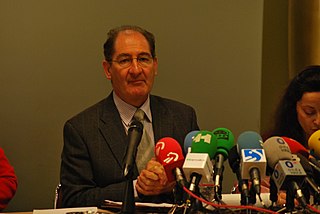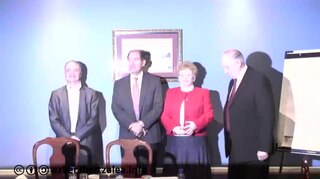Related Research Articles

The Continuity Irish Republican Army, styling itself as the Irish Republican Army, is an Irish republican paramilitary group that aims to bring about a united Ireland. It claims to be a direct continuation of the original Irish Republican Army and the national army of the Irish Republic that was proclaimed in 1916. It emerged from a split in the Provisional IRA in 1986 but did not become active until the Provisional IRA ceasefire of 1994. It is an illegal organisation in the Republic of Ireland and is designated a terrorist organisation in the United Kingdom, New Zealand and the United States. It has links with the political party Republican Sinn Féin (RSF).
The Real Irish Republican Army, or Real IRA (RIRA), was a dissident Irish republican paramilitary group that aimed to bring about a United Ireland. It was formed in 1997 following a split in the Provisional IRA by dissident members, who rejected the IRA's ceasefire that year. Like the Provisional IRA before it, the Real IRA saw itself as the only rightful successor to the original Irish Republican Army and styled itself as simply "the Irish Republican Army" in English or Óglaigh na hÉireann in Irish. It was an illegal organisation in the Republic of Ireland and designated as a proscribed terrorist organisation in the United Kingdom and the United States.

HM Prison Maze was a prison in Northern Ireland that was used to house paramilitary prisoners during the Troubles from August 1971 to September 2000. On 15 October 1974 Irish Republican internees burned 21 of the compounds used to house the internees thereby destroying much of Long Kesh.

The Loyalist Volunteer Force (LVF) was an Ulster loyalist paramilitary group in Northern Ireland. It was formed by Billy Wright in 1996 when he and his unit split from the Ulster Volunteer Force (UVF) after breaking its ceasefire. Most of its members came from the UVF's Mid-Ulster Brigade, which Wright had commanded. In a two-year period from August 1996, the LVF waged a paramilitary campaign in opposition to Irish republicanism and the Northern Ireland peace process. During this time it killed at least 14 people in gun and bomb attacks, almost all of them Catholic civilians killed at random. The LVF called off its campaign in August 1998 and decommissioned some of its weapons, but in the early 2000s a loyalist feud led to several killings. Since then, the LVF has been largely inactive, but its members are believed to have been involved in rioting and organized crime. In 2015, the security forces stated that the LVF "exists only as a criminal group" in Mid-Ulster and Antrim.

The Ulster Defence Association (UDA) is an Ulster loyalist paramilitary group in Northern Ireland. It was formed in September 1971 as an umbrella group for various loyalist groups and undertook an armed campaign of almost 24 years as one of the participants of the Troubles. Its declared goal was to defend Ulster Protestant loyalist areas and to combat Irish republicanism, particularly the Provisional Irish Republican Army (IRA). In the 1970s, uniformed UDA members openly patrolled these areas armed with batons and held large marches and rallies. Within the UDA was a group tasked with launching paramilitary attacks that used the cover name Ulster Freedom Fighters (UFF) so that the UDA would not be outlawed. The British government proscribed the UFF as a terrorist group in November 1973, but the UDA itself was not proscribed until August 1992.

The Democratic Unionist Party (DUP) is a unionist, loyalist, British nationalist and national conservative political party in Northern Ireland. It was founded in 1971 during the Troubles by Ian Paisley, who led the party for the next 37 years. Currently led by Jeffrey Donaldson, it is the second largest party in the Northern Ireland Assembly, and is the fifth-largest party in the House of Commons of the United Kingdom. The party has been described as centre-right to right-wing and socially conservative, being anti-abortion and opposing same-sex marriage. The DUP sees itself as defending Britishness and Ulster Protestant culture against Irish nationalism and republicanism. It is also Eurosceptic and supported Brexit.

The 1998 Northern Ireland Assembly election took place on Thursday, 25 June 1998. This was the first election to the new devolved Northern Ireland Assembly. Six members from each of Northern Ireland's eighteen Westminster Parliamentary constituencies were elected by single transferable vote, giving a total of 108 Members of the Legislative Assembly (MLAs).

Peter David Robinson is a retired Northern Irish politician who served as First Minister of Northern Ireland from 2008 until 2016 and Leader of the Democratic Unionist Party (DUP) from 2008 until 2015. Until his retirement in 2016, Robinson was involved in Northern Irish politics for over 40 years, being a founding member of the DUP along with Ian Paisley.
The Northern Ireland peace process includes the events leading up to the 1994 Provisional Irish Republican Army (IRA) ceasefire, the end of most of the violence of the Troubles, the Good Friday Agreement of 1998, and subsequent political developments.
The Independent Monitoring Commission (IMC) was an organisation founded on 7 January 2004, by an agreement between the British and Irish governments, signed in Dublin on 25 November 2003. The IMC concluded its operations on 31 March 2011.

Monica Mary McWilliams is a Northern Irish academic, peace activist, human rights defender and former politician.

Ulster Resistance (UR), or the Ulster Resistance Movement (URM), is an Ulster loyalist paramilitary movement established by the Democratic Unionist Party (DUP) in Northern Ireland in November 1986 in opposition to the Anglo-Irish Agreement.
Families Acting for Innocent Relatives (FAIR) is a non-governmental organisation founded in 1998 in County Armagh, Northern Ireland. Based in Markethill, it describes itself as a "non-sectarian, non-political organisation" that works "in the interests of the innocent victims of terrorism in South Armagh."

Aidan McAnespie was an Irish Catholic man who was shot in the back by a serving soldier after passing through the Aughnacloy, County Tyrone border checkpoint in Northern Ireland during the Troubles. In November 2022 former British soldier David Holden was found guilty of manslaughter.

Brian Currin is a South African lawyer who was instrumental in the establishment of the Truth and Reconciliation Commission.
Sir John Niall Henderson Blelloch was a British civil servant who was Permanent Under Secretary of State at the Northern Ireland Office from 1988 to 1990.

The Good Friday Agreement (GFA) or Belfast Agreement is a pair of agreements signed on 10 April, Good Friday, 1998, that ended most of the violence of the Troubles, an ethno-nationalist conflict in Northern Ireland that had prevailed since the late 1960s. It was a major development in the Northern Ireland peace process of the 1990s. It is made up of the Multi-Party Agreement between most of Northern Ireland's political parties, and the British–Irish Agreement between the British and Irish governments. Northern Ireland's present devolved system of government is based on the agreement.
Decommissioning in Northern Ireland was a process in the Belfast Agreement as part of the Northern Ireland peace process. Under the Good Friday Agreement/ Belfast Agreement, all paramilitary groups fighting in the Troubles would be subject to decommission. Decommissioning was a defining issue in the effort to negotiate peace in Northern Ireland.

The International Contact Group (ICG) is a group promoted by Brian Currin aiming to "expedite, facilitate and enable the achievement of political normalization in the Basque Country". The members of the Group, presented on 14 February 2011 in Bilbao, are Silvia Casale, Pierre Hazan, Raymond Kendall, Nuala O'Loan and Alberto Spektorowski.
Clifford Peeples is a self-styled pastor in Northern Ireland who has been associated with Ulster loyalism, for which he was convicted of terrorist activity and imprisoned. Peeples has been a member of the Ulster Volunteer Force (UVF), the Loyalist Volunteer Force (LVF) prisoners' spokesman and leader of the Orange Volunteers (OV). He has taken a prominent role in opposing the Northern Ireland Protocol in the courts.
References
This article includes a list of references, related reading, or external links, but its sources remain unclear because it lacks inline citations .(March 2023) |
- ↑ "Sentence Review Commissioners". Sentence Review Commissioners. Retrieved 14 December 2023.
- ↑ "About the Sentence Review Commissioners". Sentence Review Commissioners. 8 July 2019. Retrieved 14 December 2023.
- ↑ "Sentence Review Commissioners in Northern Ireland". Sentence Review Commission. Archived from the original on 31 August 2018.
Sources
- BBC NI - Schools - Agreement - Policing - Prisoners BBC NI. Accessed 3 November 2007
- BBC NI - CAJ Report July/August 1998 BBC NI. Accessed 3 November 2007
- Northern Ireland (Sentences) Act 1998 Office of Public Sector Information. Accessed 3 November 2007
- The Members Sentence Review Commission. Accessed 3 November 2007
- About the Commission Sentence Review Commission. Accessed 3 November 2007